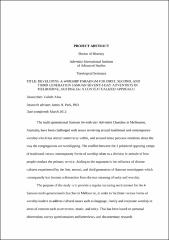Developing a worship paradigm for first, second, and third generation Samoan Seventh-day Adventists in Melbourne, Australia : a contextualized approach
Abstract
The multi-generational Samoan Seventh-day Adventist Churches in Melbourne, Australia, have been challenged with issues revolving around traditional and contemporary worship which has stirred controversy within, and aroused tense personal emotions about the way the congregations are worshipping. The conflict between the 2 polarized opposing camps of traditional versus contemporary forms of worship relate to a division in attitude of how people conduct the primary service. Adding to the argument is the influence of diverse cultures experienced by the first, second, and third generation of Samoan worshippers which consequently has become a distraction from the real meaning of unity and worship.
The purpose of the study is to provide a regular nurturing environment for the 4 Samoan multi-generational churches in Melbourne, in order to facilitate various forms of worship leaders to address cultural issues such as language, family and corporate worship in areas of concern such as reverence, music, and unity. This has been based on personal observation, survey questionnaires and interviews, and documentary research.
In examining the biblical and cultural ways of worship, a feasible nurturing model is developed as follows: (1) nurturer, pastor and first generation; (2) mentor, second generation; and (3) trainees, third generation. The study concludes with a combined 4 day camp for the 4 Samoan churches designed for the nurturer, mentor, and the trainees to implement the recommended nurturing strategies: (1) participate as an assembly in a cultural ceremony and biblical ritual. As representations of worship, it was envisioned that contextualization of the 2 formal procedures elicit an awareness of worship and cultural sacredness, honour, and respect; (2) 6 workshops based on family and corporate worship; and (3) 3 seminars on aspects of Samoan culture. Other relevant resources such as a contextualized Passover, seminars and workshop materials, and a camp evaluation sheet are sited in the appendixes. The camp endeavours not only to contribute to increasing the effectiveness of the worship unity amongst the Samoan Seventh-day Adventist Churches in Melbourne, Australia, but also towards the ongoing nurturing processes of worship leaders to perpetuate biblical worship and appropriate cultural forms within the churches.


